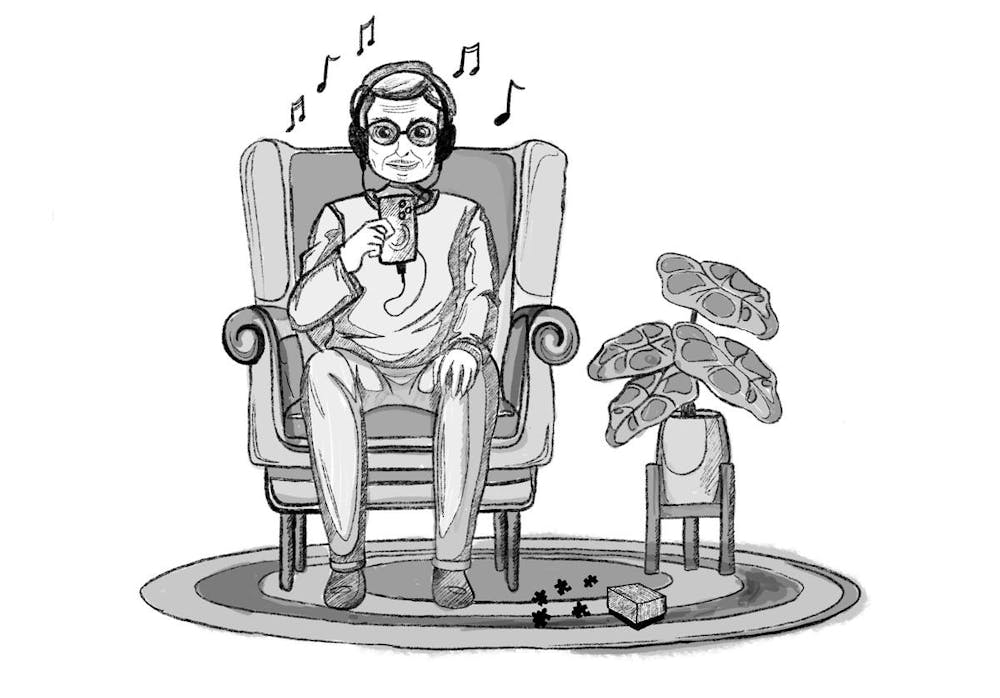Music takes a myriad of forms, from lullabies to national anthems, each with a unique purpose. Researchers at the School of Public Health have discovered that listening to personalized music can temporarily decrease verbally agitated behaviors and increase observed pleasure in dementia patients in nursing homes. Where the standard alternatives for treatment would be antipsychotic medications, non-pharmacological interventions like personalized music could leave a lasting impact.
Personalization may be the key to this intervention, according to Ellen McCreedy, assistant professor of health services, policy and practice. “Most people can understand music taking them back to a point in their lives,” she said.
McCreedy explained that many people may have an intuitive understanding of a particular song or genre through which they can recall a distinct moment in their life. As a result, music can act as a kind of touchstone for dementia patients.
According to McCreedy, staff at nursing homes and family members helped generate personalized recommendations for patients, adding music that was popular when patients were much younger.
“How best to personalize music is an ongoing question,” said Anthony Sisti GS, a PhD candidate in biostatistics and the first author of the study. “Age, location and other factors were considered in trying to create a playlist that was the closest to what the patient might have listened to.”
Throughout the study, nursing home staff used individual iPods to play music for patients in response to signs of early agitation. Data collection centered around in-person observation in nursing homes over four months, Sisti said.
“Anecdotally, many people talk about music therapy for dementia patients,” he explained. “We thought looking at this alternative measure of structured observations might be more sensitive to potential changes than” a traditional quantitative study.
Funded by the National Institute for Health and the National Institute of Aging, the study focused on a control and experimental group of nursing home residents who listened to personalized music. Behavioral data was collected during morning, afternoon and evening sessions, according to Sisti.
The research team led a geographically and characteristically diverse study, with a sample population of 54 nursing homes across the country and 976 residents with “Alzheimer’s disease or related dementias.”
Data collectors looked for signs of agitation in patients, Sisti explained. “Attention-seeking, repetition, complaining, screaming and groaning are some verbal signs,” he said. “Physical signs include hitting, kicking, pushing, scratching, tearing and cursing.”
When these signs are observed, McCreedy and Sisti said that standard medical practice is to prescribe antipsychotic drugs. This study is impactful, Sisti said, because its objective is to determine whether musical interventions can replace the sweeping use of antipsychotics and sedatives in nursing homes.
According to Sisti, using the sophisticated Agitated Behavior Mapping Instrument to analyze results allowed the team to note the direct impacts of music on increasing pleasure in patients. Music itself, however, is not new as a method of caring for aging populations.
“There’s a lot of music in nursing homes,” McCreedy said. “Nursing homes are aware that drugs used to manage behaviors are not good for their residents. They’re always looking for non-pharmacological approaches.”
Finding evidence of musical interventions’ possible efficacy is a powerful motive for Sisti. He also noted that advanced dementia patients don’t have a say in whether or not they are prescribed medications.
According to Gary Epstein-Lubow, associate professor of psychiatry and human behavior, medical science and health services, policy and practice, non-pharmacological treatments are growing in their importance, along with “comprehensive dementia care.”
“There has been a lot of interest in music interventions and this study’s strength is that it carefully studies music in a large research sample,” Epstein-Lubow wrote in an email to The Herald. “Further study could investigate the benefits of preventing physical aggression or if the overall reduction in non-physical agitation has other benefits, including for other residents and staff.”
McCreedy said that some staff have learned more about patients whose dementia has progressed to nonverbal stages from their responses to the music intervention.
“Ninety percent of the time, in a nursing home, nursing home residents aren't doing anything at all,” McCreedy said. “It matters, giving people moments of connectedness to their past of joy.”

Ranjana “Jaanu” Ramesh is a Bruno Brief-er, photographer and Senior Staff Writer covering science & research. She loves service, empathetic medicine and working with kids. When not writing or studying comp neuro, Jaanu is outside, reading, skiing, or observing Providence wildlife (ie: squirrels).





